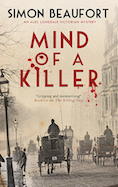 All is not glorious and progressive in Victoria’s capital city, as London has another side replete with crime, murder, and poverty.
All is not glorious and progressive in Victoria’s capital city, as London has another side replete with crime, murder, and poverty.
London, 1882. Alec Lonsdale, a reporter for The Pall Mall Gazette, is following up a story about a fatal house fire. But the post mortem on the victim produces shocking results: Patrick Donovan’s death was no accident. But why would someone murder a humble shop assistant and steal part of his brain?
A young prostitute approaches Lonsdale, claiming to have information about that and other murders, but when Lonsdale goes to meet her, he finds her with her throat cut, and her companion also dead.
Lonsdale and his spirited female colleague, Hulda Friederichs, begin seeking answers, only to find their efforts stymied at every turn by the police. Nevertheless, they manage to uncover evidence of a conspiracy that reaches the highest echelons of Victorian society. But will they ever get to finish their investigation, or will they join the list of victims first?
[button link=” https://www.amazon.co.uk/Mind-Killer-Victorian-mystery-Londale/dp/0727887629/ref=sr_1_1?s=books&ie=UTF8&qid=1509029539&sr=1-1&keywords=simon+beaufort+mind+killer” buttontext=”Amazon.co.uk”]#[/button][button link=”https://www.amazon.co.uk/Mind-Killer-Victorian-mystery-Christie-ebook/dp/B079S7FJKF/ref=tmm_kin_swatch_0?_encoding=UTF8&qid=1509029539&sr=1-1″ buttontext=”Kindle Edition”]#[/button][button link=”https://www.waterstones.com/book/mind-of-a-killer/simon-beaufort/9780727887627″ buttontext=”Waterstones”]#[/button][button link=”https://www.amazon.com/Mind-Killer-Victorian-Simon-Beaufort/dp/0727887629/ref=sr_1_1?s=books&ie=UTF8&qid=1509029696&sr=1-1&keywords=simon+beaufort+mind+killer” buttontext=”Amazon.com”]#[/button][button link=”https://www.amazon.com/Mind-Killer-Victorian-mystery-Christie-ebook/dp/B079S7FJKF/ref=tmm_kin_swatch_0?_encoding=UTF8&qid=1509029696&sr=1-1″ buttontext=”US Kindle Edition”]#[/button]
EXTRACT
The visit to the Garrick Club had not only been unproductive, it had made Lonsdale late for his meeting with Cath Walker. The bells had long since finished chiming eight and the light had almost faded when he reached the Gloucester Gate entrance to Regent’s Park. He headed toward the huge drinking fountain on the Broad Walk – the wide but poorly lit road that traversed the park from north to south.
As Lonsdale neared the fountain, which was illuminated by its own lamp, he slowed and became more cautious. The path that led to the bandstand, a short distance west, appeared to be deserted. He peered into the darkness, and could just see the outline of the bandstand, eerie in the deepening shadows. He had not realised how few lights there were and how dark the park could be; a lone, unarmed man was an easy target. But he told himself that his experiences in Africa – which had taught him more than a modicum of self-defence – combined with having boxed at Cambridge, made him capable of defending himself reasonably respectably.
He approached the bandstand warily. It had a conical roof supported by wrought-iron pillars and was surrounded by waist-high railings. The chairs on which the band sat were piled in the middle and covered with a tarpaulin. There was no one to be seen.
He was reaching for the railing when a rustle brought him to a standstill. Away to the right was a row of bushes and trees, a pleasant, shady area for those who did not want to sit in the sun to listen to music. Had the noise come from there? He took several steps towards it.
‘Miss Walker?’ he called softly. For several moments, nothing happened, then there was a dull thud behind him. He had spun round before realising with disgust that he had fallen for an old trick: someone had thrown a stone behind him to make him turn, so he could be attacked from behind.
He had barely started to whip back around when he was knocked from his feet. He went sprawling onto the wet ground, feeling sodden grass against his face. He rolled, aware that his attacker was already bearing down on him. Against the dark grey sky, he saw something glint before it plunged down.

